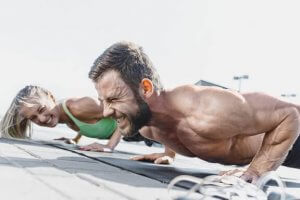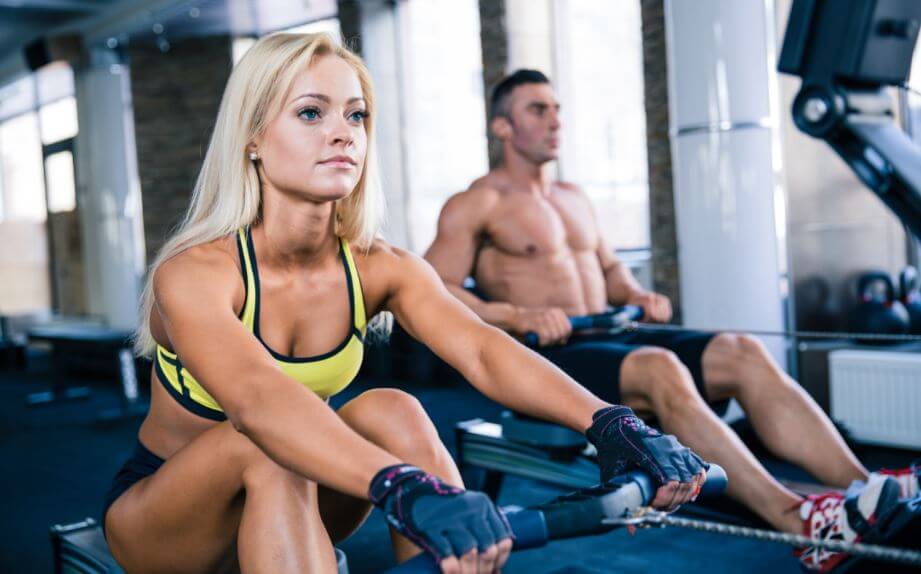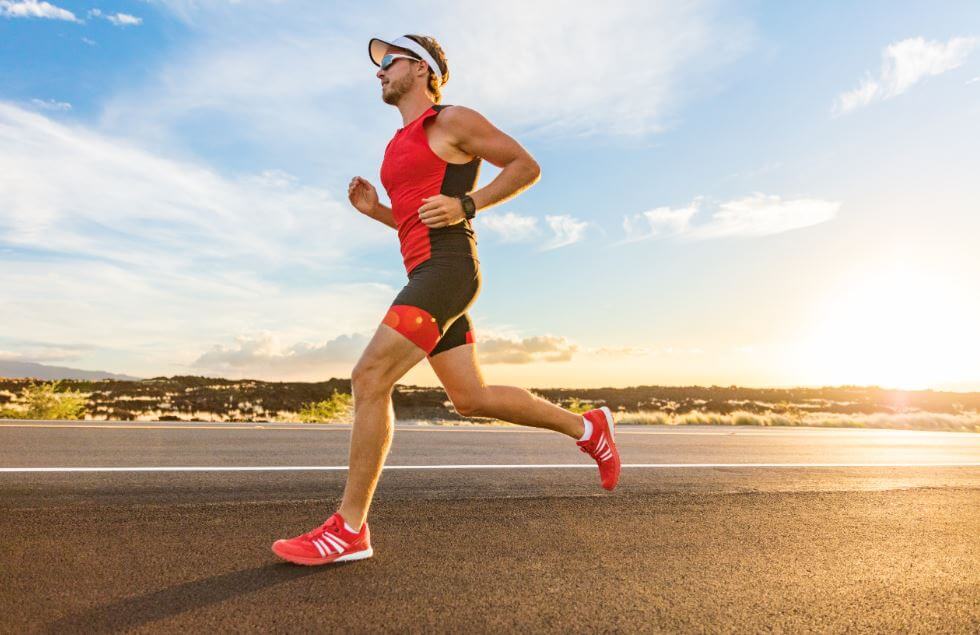Curious Things That Happen to Your Body When You Exercise

The human body is more complex than you could ever imagine when it comes to performing its daily functions. In this article, we’ll share some curious things that happen in your body as you exercise.
Comprising of several organs, the human body consists of different systems that complement each other, working together to keep the whole body functioning. Various peculiarities occur in your body while you exercise that you may or may not have recognized.
Most people only know the basics of how the human body works. However, you should know that the more you understand about your body, the better you can take care of it.
What happens to the body during exercise?
While exercising, the different muscles, organs, ligaments, and hormones work together to perform the movements and to comply with the necessary processes that exercise demands.
In addition to the normal occurrences such as an increased heart rate, elimination of toxins and the liberation of endorphins, there are also curious things that occur! Here’s a list that we compiled for you:
You become smarter
Exercising will not make you as intelligent as Albert Einstein, however, your brain behaves differently if you start to exercise regularly.
Your brain will start to work more efficiently due to an increase in blood flow which also increases the brain’s oxygen supply. Therefore, exercise can help you to break down and analyze information more efficiently.

Exercise can also improve your concentration and coordination. Likewise, you’ll be able to retain more information about your environment.
You’ll need to go to the bathroom
Surely, you’ve have had to visit the bathroom more than once during training? When exercising, the gastrointestinal organs are stimulated and therefore the process of waste elimination is accelerated.
Your level of hydration and the foods that you previously ingested prior to exercise are all factors that will influence the frequency of bathroom visits. That’s why it’s wise to have a balanced diet and to leave a period of time between eating and exercising.
Nausea
This is a common occurrence when people start exercising or after increasing the intensity of their workouts. Nausea is caused by the increase in blood flow to the digestive system. Also, different movements can affect the stomach too.
In some cases, nausea can even lead to vomiting. Vomiting can occur after very intense workouts. Keep in mind, however, that you should consult your doctor if this happens regularly.
Dizziness
Feeling dizzy or experiencing vertigo is not a product of your imagination. Neither does it necessarily mean that something is wrong with you.
It just happens that, when exercising, the size of the heart’s ventricles increase. If you stop exercising abruptly or take long pauses, blood flow is reduced and this can cause dizziness.
This is why you should never abruptly stop exercising. If you are very tired and would like to take a break, gradually reduce the intensity until you can stabilize your breathing and heart rate before sitting down to rest.

Irritated nipples
This is exclusively for runners. During marathons or long distance runs, novices often end up with irritated or even bleeding nipples. This is caused by the salt that sweat contains which later drys and causes a skin reaction. The friction of the rubbing fabric is also an important factor that causes irritation.
Professionals often use special protectors to prevent irritation. If you are an amateur, however, you can resort to cheaper alternatives such as Vaseline or adhesive bandages.
In conclusion, going to the bathroom, vomiting or having more lucid thoughts are all curious things that can happen while exercising. You may have even experienced at least one of the symptoms that we mentioned. Now that you know a little more about your body, you can see that these occurrences are not as curious as you thought!
The human body is more complex than you could ever imagine when it comes to performing its daily functions. In this article, we’ll share some curious things that happen in your body as you exercise.
Comprising of several organs, the human body consists of different systems that complement each other, working together to keep the whole body functioning. Various peculiarities occur in your body while you exercise that you may or may not have recognized.
Most people only know the basics of how the human body works. However, you should know that the more you understand about your body, the better you can take care of it.
What happens to the body during exercise?
While exercising, the different muscles, organs, ligaments, and hormones work together to perform the movements and to comply with the necessary processes that exercise demands.
In addition to the normal occurrences such as an increased heart rate, elimination of toxins and the liberation of endorphins, there are also curious things that occur! Here’s a list that we compiled for you:
You become smarter
Exercising will not make you as intelligent as Albert Einstein, however, your brain behaves differently if you start to exercise regularly.
Your brain will start to work more efficiently due to an increase in blood flow which also increases the brain’s oxygen supply. Therefore, exercise can help you to break down and analyze information more efficiently.

Exercise can also improve your concentration and coordination. Likewise, you’ll be able to retain more information about your environment.
You’ll need to go to the bathroom
Surely, you’ve have had to visit the bathroom more than once during training? When exercising, the gastrointestinal organs are stimulated and therefore the process of waste elimination is accelerated.
Your level of hydration and the foods that you previously ingested prior to exercise are all factors that will influence the frequency of bathroom visits. That’s why it’s wise to have a balanced diet and to leave a period of time between eating and exercising.
Nausea
This is a common occurrence when people start exercising or after increasing the intensity of their workouts. Nausea is caused by the increase in blood flow to the digestive system. Also, different movements can affect the stomach too.
In some cases, nausea can even lead to vomiting. Vomiting can occur after very intense workouts. Keep in mind, however, that you should consult your doctor if this happens regularly.
Dizziness
Feeling dizzy or experiencing vertigo is not a product of your imagination. Neither does it necessarily mean that something is wrong with you.
It just happens that, when exercising, the size of the heart’s ventricles increase. If you stop exercising abruptly or take long pauses, blood flow is reduced and this can cause dizziness.
This is why you should never abruptly stop exercising. If you are very tired and would like to take a break, gradually reduce the intensity until you can stabilize your breathing and heart rate before sitting down to rest.

Irritated nipples
This is exclusively for runners. During marathons or long distance runs, novices often end up with irritated or even bleeding nipples. This is caused by the salt that sweat contains which later drys and causes a skin reaction. The friction of the rubbing fabric is also an important factor that causes irritation.
Professionals often use special protectors to prevent irritation. If you are an amateur, however, you can resort to cheaper alternatives such as Vaseline or adhesive bandages.
In conclusion, going to the bathroom, vomiting or having more lucid thoughts are all curious things that can happen while exercising. You may have even experienced at least one of the symptoms that we mentioned. Now that you know a little more about your body, you can see that these occurrences are not as curious as you thought!
All cited sources were thoroughly reviewed by our team to ensure their quality, reliability, currency, and validity. The bibliography of this article was considered reliable and of academic or scientific accuracy.
- Nanda, B., & Manjunatha, S. (2015). Exercise and Cognitive Functions. In Diet and Exercise in Cognitive Function and Neurological Diseases(pp. 213–223). Wiley Blackwell. https://doi.org/10.1002/9781118840634.ch19
- Serratosa Fernández, L. (2001). Adaptaciones cardiovasculares del deportista. In 2do. Congreso Virtual de Cardiología Congreso Internacional de Cardiología por Internet. Retrieved from http://www.fac.org.ar/scvc/llave/PDF/serratoe.PDF
- Urdampilleta Otegui, A., Martínez Sanz, J. M., Julia Sánchez, S., & Álvarez Herms, J. (2013). Protocolo de hidratación antes, durante después de la actividad físico-deportiva. European Journal of Human Movement, ISSN 0214-0071, No. 31, 2013, Págs. 57-76, (31), 57–76.
- Coggan, A. R. and Coyle, E. F. (1991). Carbohydrate ingestion during prolonged exercise: Effects on metabolism and performance. Exercise and Sports Science Reviews, 19, 1–40. https://doi.org/10.1249/00003677-199101000-00001
- Haub, M. D. (2008). Sports Nutrition: Energy Metabolism and Exercise. JAMA, 299(19), 2330. https://doi.org/10.1001/jama.299.19.2330
This text is provided for informational purposes only and does not replace consultation with a professional. If in doubt, consult your specialist.








